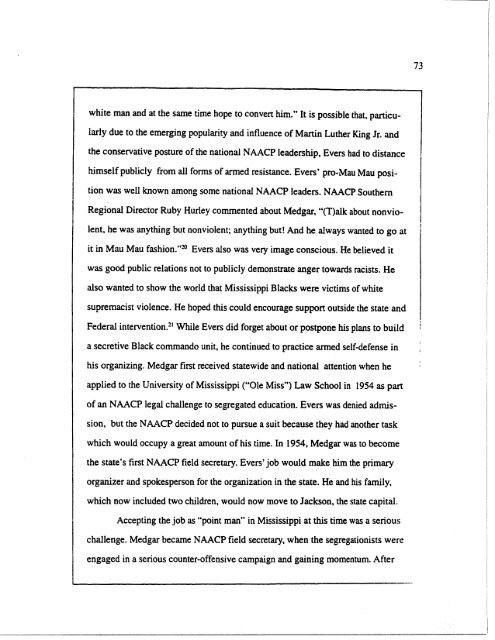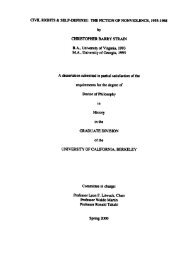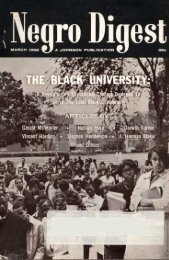- Page 1 and 2:
Eye for an Eye: The Role ofArmed Re
- Page 3 and 4:
This is an authorized facsimile, ma
- Page 5 and 6:
ABSTRACT Although, the Civil Rights
- Page 7 and 8:
Light and Power on their spirits Mo
- Page 9 and 10:
Eye for an Eye: The Role ofArmed Re
- Page 11 and 12:
TABLE OF CONTENTS Introduction 1 Ch
- Page 13 and 14:
armed resistance in Black struggle
- Page 15 and 16:
Review of the Literature The Litera
- Page 17 and 18:
from advocates of armed self-defens
- Page 19 and 20:
the Movement. Each of these authors
- Page 21 and 22:
whom were committed to and practice
- Page 23 and 24:
and enforced against Black humanity
- Page 25 and 26:
transcript" of insurgency that has
- Page 27 and 28:
Chapter One: Historic Armed Black R
- Page 29 and 30:
to Kongolese armies. The use of arm
- Page 31 and 32:
people who were antagonistic to the
- Page 33 and 34: nation, and to promise Africans fre
- Page 35 and 36: coons to chattel status. Rather tha
- Page 37 and 38: South legal . The Seminoles prepare
- Page 39 and 40: more than slaves or mercenaries . A
- Page 41 and 42: maroons, calling themselves the "Ki
- Page 43 and 44: Adams county, Mississippi, in 1861
- Page 45 and 46: The same year abolitionist and fugi
- Page 47 and 48: separate Black army with its own "c
- Page 49 and 50: soldiers defended their sisters and
- Page 51 and 52: Southern whites were not willing to
- Page 53 and 54: die where they stood before they wo
- Page 55 and 56: teers throughout Hinds county. Real
- Page 57 and 58: supremacy was not secure without th
- Page 59 and 60: hours . While in each case there we
- Page 61 and 62: of Alabama, to be armed at their me
- Page 63 and 64: initiated gunfire after hearing rum
- Page 65 and 66: apists . In February of 1948, Mrs.
- Page 67 and 68: U .S . Army, was known as a sharpsh
- Page 69 and 70: 11 . Kenneth Wiggins Porter, The Ne
- Page 71 and 72: 31 . Edwin S. Redkey, AGrand Army o
- Page 73 and 74: North Carolina Press, 19903, 44-45
- Page 75 and 76: in the Age of Jim C,Eow, states tha
- Page 77 and 78: S 1,614 for whites . Close to two-t
- Page 79 and 80: ers his father would not allow him
- Page 81 and 82: ist mob continued their intimidatio
- Page 83: unit designed after the Mau Mau of
- Page 87 and 88: he refused to persuade the thirty r
- Page 89 and 90: Meredith to "Ole Miss." Because of
- Page 91 and 92: eturned home around midnight . Myrl
- Page 93 and 94: 11 . C.O . Chinn, interview by the
- Page 95 and 96: crime . He was abducted by a mob of
- Page 97 and 98: Chapter Three: The Non-Violent Move
- Page 99 and 100: as the popular leader of this new o
- Page 101 and 102: ments for protest based on moral an
- Page 103 and 104: ticed some form of self-defense cov
- Page 105 and 106: and NAACP organizer. Moore had assi
- Page 107 and 108: On Moore's recommendation, Moses fi
- Page 109 and 110: house, under pillows, under chairs
- Page 111 and 112: lacks to challenge Amite's white po
- Page 113 and 114: including Medgar Evers and Roy Wilk
- Page 115 and 116: practice of self-defense . To warn
- Page 117 and 118: Mississippi officials, charging the
- Page 119 and 120: Anyone participating in the march h
- Page 121 and 122: and harassed, local police did not
- Page 123 and 124: Blacks alike were amazed that the g
- Page 125 and 126: ase for SNCCICOFO and the Mississip
- Page 127 and 128: with its own identity in the state
- Page 129 and 130: military soured after Chinn openly
- Page 131 and 132: Besides this group of protective gu
- Page 133 and 134: for younger activists to challenge
- Page 135 and 136:
9, 1984, 1-B- 10B ; Chuck McDew int
- Page 137 and 138:
47 . Ibid, 178-179 ; Dennis, interv
- Page 139 and 140:
demonstrate that disenfranchised Mi
- Page 141 and 142:
franchised Black voters, the organi
- Page 143 and 144:
themselves and advising SNCC activi
- Page 145 and 146:
massacre as implied by Hall . Other
- Page 147 and 148:
to be a force in the Southern movem
- Page 149 and 150:
CORE also was engaged in debate con
- Page 151 and 152:
Schwerner, and one Freedom Summer v
- Page 153 and 154:
Goodman . Another element of this c
- Page 155 and 156:
Black history, Movement politics, a
- Page 157 and 158:
Harmony school and bused Harmony's
- Page 159 and 160:
economic arena was also displayed i
- Page 161 and 162:
on, in Brown's words, the "organiza
- Page 163 and 164:
There was a fine line . There was a
- Page 165 and 166:
(formerly known as Stokley Carmicha
- Page 167 and 168:
Union Baptist Church, led by its pa
- Page 169 and 170:
terrorist violence was initiated by
- Page 171 and 172:
Reeves family had a history of bein
- Page 173 and 174:
and Movement activists of McComb .
- Page 175 and 176:
friend by pretending he was only pa
- Page 177 and 178:
and cohesiveness of each community.
- Page 179 and 180:
lenge the credentials of the segreg
- Page 181 and 182:
5 . Hollis Watkins, interviewed in
- Page 183 and 184:
28 . Dovie Hudson, interviewed in B
- Page 185 and 186:
56 . Bob Moses, interview by the au
- Page 187 and 188:
turn followed a different posture t
- Page 189 and 190:
cials were uneasy about Charles bec
- Page 191 and 192:
Cooper stated " We had 30.06. We ha
- Page 193 and 194:
Charles Evers's stated: He encourag
- Page 195 and 196:
the boycott. Arange of coercive tac
- Page 197 and 198:
thereby silenced and neutralized by
- Page 199 and 200:
crushed when a police car led a Kla
- Page 201 and 202:
Robert Williams . Thomas had read a
- Page 203 and 204:
of the Deacons in Bogulusa. The lea
- Page 205 and 206:
McKeithen also called for negotiati
- Page 207 and 208:
settlers . Natchez was the hub for
- Page 209 and 210:
would spark an acceleration of acti
- Page 211 and 212:
Even though the police officers wer
- Page 213 and 214:
U.S . Constitution [including the S
- Page 215 and 216:
e known, you better figure on dying
- Page 217 and 218:
situation that day: These pecker wo
- Page 219 and 220:
of the Deacons capabilities, provid
- Page 221 and 222:
unless City government acted favora
- Page 223 and 224:
Black community to enforce its deci
- Page 225 and 226:
claiming victory , announcing the m
- Page 227 and 228:
teams to enforce the boyott1 In Cla
- Page 229 and 230:
argument between Shields, and a whi
- Page 231 and 232:
Jackson also led to near uprising b
- Page 233 and 234:
implementing the Natchez model, Rud
- Page 235 and 236:
Okolona, Tupelo, and Byhalia. The U
- Page 237 and 238:
18 . Porter, Interview with Deacon
- Page 239 and 240:
44 . Ibid ; Young, interview by aut
- Page 241 and 242:
73 . Ibid. 74 . James Scott, interv
- Page 243 and 244:
CONCLUSION ". . ..the armed liberat
- Page 245 and 246:
existence of armed resistance in th
- Page 247 and 248:
Some may argue that the evidence pr
- Page 249 and 250:
ofthe Movement and doesn't apprecia
- Page 251 and 252:
it was necessary for the Black comm
- Page 253 and 254:
the white power structure but also
- Page 255 and 256:
Significance of "Eye forAn Eye" It
- Page 257 and 258:
4 . Comel West, Progb= Deliverance
- Page 259 and 260:
Herman Leach, July 30,1994, Yazoo C
- Page 261 and 262:
Correspondence Letter from Sundiata
- Page 263 and 264:
Carson, Clayborne, et al. The Eyes
- Page 265 and 266:
Jordan, Winthrop, Tumult and Silenc
- Page 267 and 268:
Payne, Charles, 1've Got the Light
- Page 269 and 270:
DissertationslTheses Barksdale, Mar

















